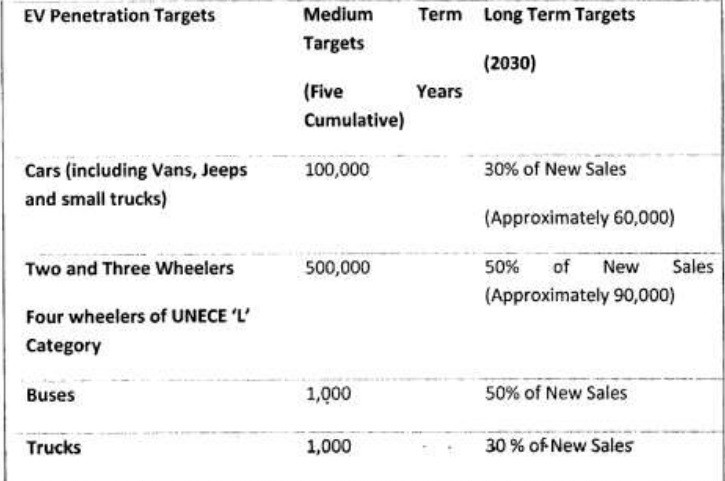The Prime Minister‘s Committee on Climate Change in its first meeting held on May 17, 2019, decided that “Climate Change Division shall, in consultation with all relevant stakeholders, examine the practical and financial viability of the “Incentive Package” to introduce Electric Vehicles in Pakistan and policy on EVs shall be placed before the Cabinet”.
In line with the above-mentioned directions, the Ministry of Climate Change undertook a number of consultative sessions with the relevant stakeholders (including FBR, Petroleum Division, Oil refineries/OMCs, and EDB, M/o Industries) to formulate the National Electric Vehicle Policy.
The Electric Vehicle Policy was submitted to the Cabinet after intensive consultations with relevant stakeholders.
The Cabinet approved the National Electric Vehicle Policy in its meeting held on November 5, 2019.
These EV penetration targets are as follows:
The Electric Vehicle Policy aims to achieve the aforementioned targets by offering incentives to customers and industry, providing guidelines to the concerned authorities, and by detailing various other requisite measures needed to achieve the set targets.
The salient aspects of the National Electric Vehicle Policy are as follows:
Incentives
Incentives for new cars:
The incentives related to electric cars are listed below:
- All-Electric Vehicles (EVs) manufactured locally shall be sold at 1% GST for the first seven years
- Electric Vehicles shall be exempted from the vehicle registration fee and annual token tax.
- All EV specific parts shall be allowed import at 1% custom duty for the next two years.
- All EV specific components and modules used in manufacturing EV parts shall be allowed at 1% customs duty for the next seven years.
- For the first two years, up to 3 years old ‘used‘ all-EVs shall be allowed import for transfer of technology (ToT) as the local manufacturing industry gets mature.
Incentives for Two and Three Wheelers/Low Speed Electric Cars:
- All Electric Vehicles manufactured locally will be sold at 1% GST for seven years respectively.
- EVs shall be exempted from registration fees and annual token tax.
- EV specific parts shall be allowed import at 1% custom duty for the next two years.
- All EV specific components and modules used in manufacturing EV parts shall be allowed at 1% customs duty for the next seven years.
Incentives for Buses and Trucks:
- The government shall purchase 1,000 all-electric buses and will ask commercial operators to operate them for a concessionary period, given that they establish the requisite charging infrastructure.
- The first 200 electric buses shall be imported at less than 1% customs duty and be sold at 1% GST with the agreement that the other 800 buses shall be manufactured in Pakistan.
- For buses manufactured locally, the EV specific parts (nonlocal) shall be allowed import at 1% custom duty. Moreover, locally manufactured buses shall be sold at 1% GST.
- Electric Buses will have no registration fees or annual tax.
- Metro buses and BRT routs in Lahore, Islamabad/Rawalpindi, Multan and Peshawar shall be prioritized for electrification of
Incentives for Setting Up EV Manufacturing Units:
- The exiting automakers may use their already established location for converting to EV assembly/manufacturing facility under Greenfield investment regulation of prevailing Auto Development Policy 2016-21.
- The State Bank may allow lower financing rates for EV manufacturing plants to setup under Long Term Financing Facility (LTFF) to encourage prospective EV manufacturers towards export.
Incentives for EV Components and Modules Manufacturing:
- To encourage the transfer of technology, for the first two years all types of motors, batteries, electronics, and their individual components etc. utilized in EVs shall be imported at 1% custom duty and 1% GST.
- Components and parts for manufacturing of conversion kits shall be allowed import at 1% custom duty and be allowed sale at 1% GST for the first five years.
Incentives for Charging Infrastructure and Batter Swapping Stations:
- For the first two years all level-2, level-3, and any other chargers beyond level-3 shall be imported at 1% custom duty and 1% GST. The same custom duty and GST incentives will also apply to their components.
- All entities offering public level-2 charging shall be allowed to show the installation cost of the charging facility as Corporate Social Responsibility (CSR) contribution.
- Other new technologies of charging like a supercapacitor, stationary and on-road wireless charging and other upcoming technologies shall be allowed at 1% custom duty and 1% GST for the first 5 years.
- All chargers above Level-1 shall be installed with special electricity smart meters to bill the electricity cost accurately and also to control peaks at the grid.
Charging Infrastructure
- Charging infrastructure shall be installed at different points in all major cities. In each major city at least one DC fast charging station shall be installed in every 3×3 km area.
- DC fast chargers shall be installed along major motorways and highways after every 25-50 km on both sides of the road.
- A pilot charging infrastructure shall be carried out in Lahore due to smog issues. DISCOS shall be responsible to identify the feeders load from DC fast chargers that can be managed.
- Existing CNG and Fuel stations are encouraged to take a leading role in the establishment of charging infrastructure. In this regard, Oil Marketing Companies (OMC‘s) are encouraged to take a leading role in the development of charging infrastructure for EVs.
Note: The above information was shared with the Senate by the Minister for Climate Change Zartaj Gul on June 10, 2020.
